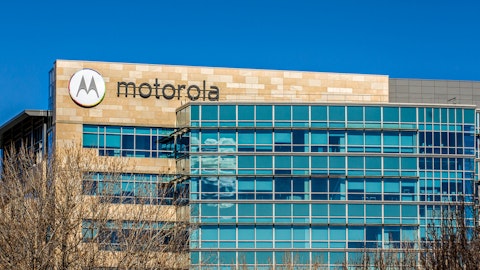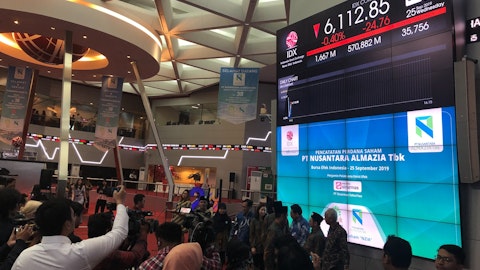Jason Winkler: Hi George, thanks for the question. So we began the year with an expectation for $50 million of lower costs related to premiums through brokers. We’re trending a bit better than that. We’re on path to about a $60 million year-over-year benefit largely in the first half. We’re still spending some investments on brokers. As we look into next year, we would expect to comparable benefit level of about $60 million into 2024 for brokers. Again, the supply chain environment remains fluid. It’s incrementally better, but we’re still using the same tools we’ve been using for over a year to make sure that we get the supplies that we need. The level of commitment from our suppliers is strong but their lead times remain elevated still. And so from time to time we will use PPV [ph] to secure the parts to match the record demand that we’re seeing.
Greg Brown: And I do have to say thanks to for all the engineers in Motorola, because as we manage PPV and to Jason’s point, we’ll achieve now $60 million, a little higher than $50 million’s target. And we – that would be our goal for next year as well another $60 million. A lot of the engineers in Motorola have done real time under Molloy’s leadership and Scott Mottonen and others. They’ve done product redesign in a way that’s allowed us to substitute parts in a matter of months that also have allowed the company to be adept and firm and responsive to our customers. And I just want everybody to know on the engineering community how grateful we are for that because they were – they’ve been superstars.
George Notter: Got it. And then just as a follow-up, if I do the math, I think you’re still caring about $150 million in annualized expedite fees or brokers fees. Is that right for this year?
Jason Winkler: Yes. This year’s envelope is going to be a little less than that. It’s more important that we – as we look at next year’s envelope reducing by $60 million, that’s our current thinking. As we go through supply planning, there’s other offsets that are always in the mix around direct materials costs, some positive, some unfavorable. So as we look to next year, we see a $60 million benefit, particularly related to this opportunity from broker fees.
George Notter: Great. Okay. Thanks very much. Appreciate it.
Greg Brown: Thanks, George.
Operator: We’ll take our next question from Adam Tindle with Raymond James. Your line is open.
Adam Tindle: Okay. Thanks. Good afternoon. I just wanted to start on Airwave. Just a clarification, admittedly, I think we’re all outside our core competency and trying to read through these legal documents here, but $200 million in U.S. dollars. So I guess the first question would be just to understand how you came up with that $80 million headwind? And then secondly, what absent the appeal? What that number would go to in 2024 as we try to think about shaping our models for the worst case scenario?
Jason Winkler: Yes. So first of all, the beginning date of the deferral for revenue is consistent with the remedies order, which is August 1 to the end of the year. That’s the approximately $80 million. If you do the math on that for next year it would – it’d be approximately another $100 million step down. There are a variety of inputs that go into us servicing Airwave, the usage of the network, the one-time events that go with the network, the number of user communities that subscribe as well as inflation and other variables that go into how much revenue we recognize from the contract. All those things together last year $560 million, this year on path to $480 million and then you can do the math on the price control into next year for approximately another $100 million decline.
Adam Tindle: For the full year, yes.
Jason Winkler: For the full year, correct.
Greg Brown: And Adam, what I’d say is like I think this process is proceeding as expected. So we knew that the CMA issued a final decision. In Q2, we knew it would be followed by a remedies order statutorily, they could have gone till October to do that as late as October. They did it now in light of the remedies implementation order, that requires the accounting treatment Jason just described. It doesn’t change at all our belief and our confidence in this case, by the way. The hearing, the appeal to the competition appeals tribunal was yesterday and today. So that part is done as well. Now we will wait to see what they rule on the appeal. We have said and I’ve said we’ve been very consistent. We think this action is unprecedented overreaching.
It effectively is opening up an already agreed on binding legal contract. But we’ll see how it plays out, in the meantime, we’ve deferred the revenue through the end of this year as required and to articulate and quantify what it could be. If nothing else changed, it would be another approximately $100 million deferral or reduction of Airwave on a full year basis next year.
Adam Tindle: Okay. And that $100 million on revenue, would that also be about approximately that on the EBIT line or any way to think for us to think about EBIT on that a $100 million?
Jason Winkler: Yes, so as I mentioned to Tim, the cost structure and our needs to run this network haven’t changed. So the lower revenue largely tracks to a lower a margin amount as well.



